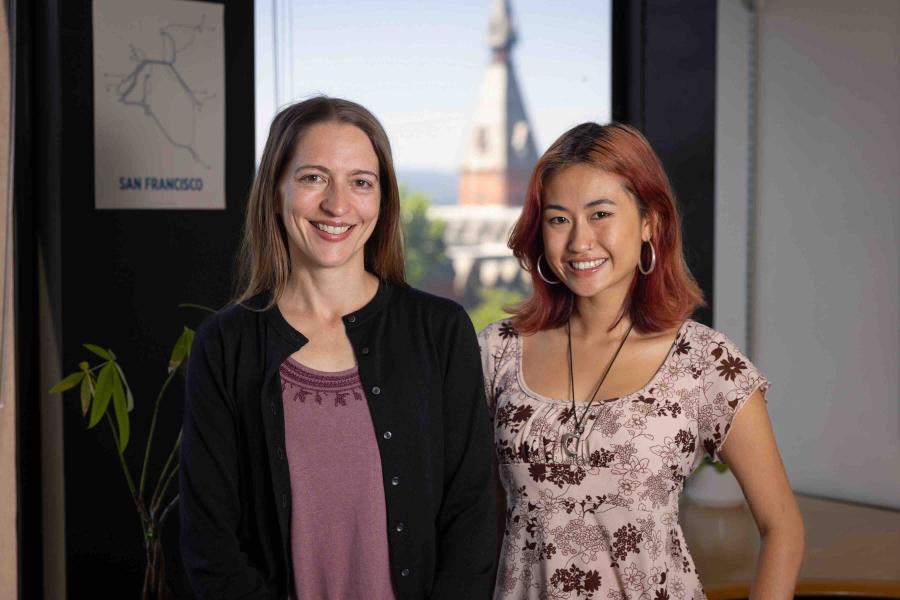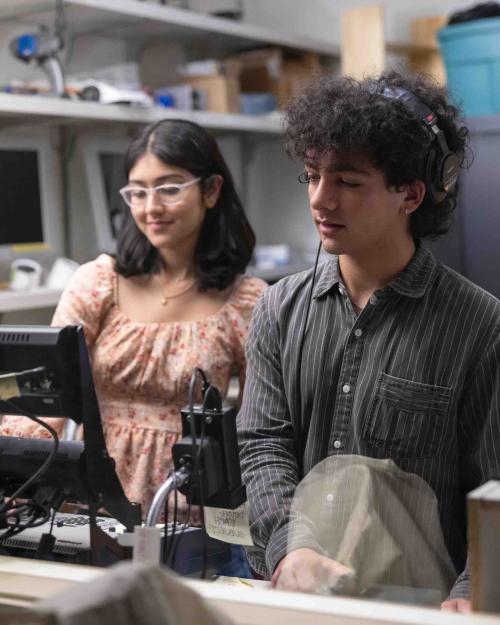This summer, Noelani Hsia ’26 is conducting research on something she’s witnessed firsthand growing up in California —climate inequality. Another pair of social science students, David Behdad ’25 and Sneah Singhi ’26, are studying infant language acquisition, working with parents and their babies.
All three students are in the College of Arts & Sciences’ Nexus Scholars Program, which provides undergraduate students with summer opportunities to conduct research with and be mentored by faculty from across the college.
“There are two highways through Oakland, 13 and 880,” Hsai said. “880 goes through communities of color and areas of low income people, while 13 runs through rich Oakland Hills areas. They make all of the large diesel trucks go on 880 not on 13, so it creates all of this pollution. It’s so crazy to see the difference.”

This summer, using data from a variety of sources such as the Environmental Protection Agency, state agencies and academic research groups, Hsai is working with Kendra Bischoff, associate professor of sociology in the College of Arts & Sciences, on an interdisciplinary project that’s part of Cornell’s Migrations Global Grand Challenge (with co-PIs Linda Shi and Laura Tach). They’ve created a database of 800 California communities facing compounding environmental vulnerabilities and are now studying 10 communities in depth to determine how these vulnerabilities are shaping migration patterns at the local level.
Along with number-crunching on government databases, Hsai’s work also includes wading through municipal and non-profit websites for each community, as well as interviewing stakeholders. The case studies will help the research team explore the local economic, social, policy and planning factors that shape responses to environmental vulnerability.
“It’s a different perspective looking at where you’re living by using data and research; instead of my own personal view, it was a view of what the numbers were saying,” said Hsai, who is double majoring in environment and sustainability and American studies, with a concentration in history and policy. “The data challenged a lot of my perceptions about what was going on in terms of income levels, the racial compositions of regions and environmental hazards. It even made me realize that the heat we experience is extreme.”
The summer project has helped Hsai gain valuable research and communication skills, she said.
“I’ve gotten better at using Excel and Google sheets,” Hsai said. “I’ve also been reading a lot of [academic] papers, so I now understand what’s going on in those and can summarize what I’ve learned.”
Bischoff said Hsai’s work will bring the data to life for people. “Her case studies combined with the publicly available version of our data, will make our data set more useful for people.”
In another part of Uris Hall, David Behdad ’25 and Sneah Singhi ’26 spend a part of their days observing and analyzing patterns of interaction between babies and their parents.
As part of the B.A.B.Y. lab, headed by psychology Professor Michael Goldstein (A&S), the students are studying language acquisition in infants. Their current study focuses on measuring the connection between an infants’ babbling and parent responsiveness.

“We’re trying to see how babies can learn language at such a young age,” Behdad said. “Even ChatGPT, which has billions of data inputs, struggles to learn language as well as a kid can do it.”
They’ve found that parent responsiveness to infant speech helps infants learn language, especially if it comes right after the babbling, is related to what the baby is babbling about and comes in that typical high-pitched happy tone that people use when talking with tots.
“I wanted to see how the research I learned about in class is actually done, and seeing it being done with babies is fascinating,” Behdad said. “And getting advice from Professor Goldstein and Julia Venditti (a doctoral student in the lab) and seeing what grad school would be like is really helpful.”
Goldstein said he encourages his Nexus students to brainstorm about their research and try out new ideas. “I want to create an environment where lots of questions are asked,” he said. “Plus, they are seeing things they haven’t seen before, so often they’ll see something interesting that we might not have thought about.” Both students are majoring in psychology and Singhi is also a double major in information science.
Students in the lab are involved in every step of the process – from recruiting families at locations such as the Ithaca Farmers’ Market to coding and analyzing data once a session is complete.
“We had to learn to speak with parents in a way that was inviting, so I think those communication skills will be something useful for me,” Singhi said. “And in the lab, if some piece of equipment wasn’t working, we had to be able to think on our feet and work together to fix it.”
“Evolution has shaped our responses to babies in ways we have not yet discovered,” Goldstein said about his work. “But we’re in the process of discovering. There’s a lot to still learn about our own species.”




